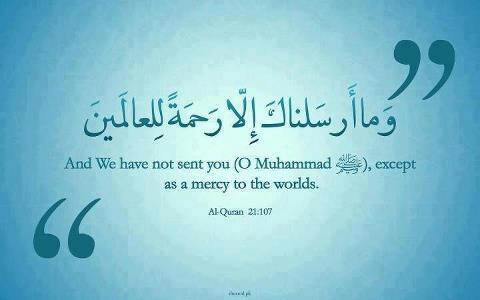
One of the most important aspects of a Muslim's life is to have high moral standards. Since the beginning of Islam, Prophet Muhammad ![]() was mainly concerned with teaching and disciplining Muslims to have the best manners and personal characteristics. His personal life and behaviour were reflective of his teachings, which were revealed to him by Allaah. In the Noble Quran, Allaah describes Prophet Muhammad
was mainly concerned with teaching and disciplining Muslims to have the best manners and personal characteristics. His personal life and behaviour were reflective of his teachings, which were revealed to him by Allaah. In the Noble Quran, Allaah describes Prophet Muhammad ![]() saying (what means): “And indeed, you are of a great moral character.” [Quran, 68:4]
saying (what means): “And indeed, you are of a great moral character.” [Quran, 68:4]
The Prophet's high standard of manners made him a model for all Muslims to follow. The Prophet ![]() used to emphasise how important good manners are for Muslims. He
used to emphasise how important good manners are for Muslims. He ![]() has said: “The best of you is the best among you in conduct.” [Al-Bukhaari and Muslim]
has said: “The best of you is the best among you in conduct.” [Al-Bukhaari and Muslim]
In another authentic narration, the Prophet ![]() mentioned that: “The heaviest thing to be placed in the balance of a believing slave on the Day of Judgement will be good behaviour. And Allaah hates the one who uses bad language.” [Al-Bayhaqi]
mentioned that: “The heaviest thing to be placed in the balance of a believing slave on the Day of Judgement will be good behaviour. And Allaah hates the one who uses bad language.” [Al-Bayhaqi]
Someone once asked the Prophet ![]() what deed would lead a man to paradise, and he
what deed would lead a man to paradise, and he ![]() answered: “Piety and good conduct.”
answered: “Piety and good conduct.”
In other narrations the Prophet ![]() made distinctions among Muslims based on their behaviour; the Prophet
made distinctions among Muslims based on their behaviour; the Prophet ![]() said: “The most perfect man in his faith, among the believers, is the one whose behaviour is the most excellent; and the best of you are those who are the best to their wives.” [Ahmad]
said: “The most perfect man in his faith, among the believers, is the one whose behaviour is the most excellent; and the best of you are those who are the best to their wives.” [Ahmad]
He even clarified that people will be on different levels in Paradise based on their good manners saying: “The dearest and nearest among you to me on the Day of Resurrection will be the one who is the best in conduct…” [Ibn An-Najjaar]
Now we shall talk about ethics in Islam, and how it is different from other ethical systems today.
Unlike other systems, the ethical system in Islam derives from a divine source. This divine source is the revelation from Allaah. Therefore, this system cannot be changed, or manipulated to fit our desires. It applies regardless of time or place. This system has not been changed for thousands of years, it cannot be changed today, and it will never change until the Day of Judgement. No one has the authority to change or alter this system, even if the whole world wants to do so. What was considered good morals in the past will remain as good morals throughout time.
What was considered as bad morals in the past will also remain so forever, even if society accepts it as a norm. The system of ethics is not affected by cultural norms, because Allaah is the One who determines what is acceptable and what is not.
The Noble Quran is very detailed and clearly mentions the significance of good manners, just like it mentions the importance of belief, worship, and all our daily affairs.
The Noble Quran mentions several good acts of morality repeatedly, for example:
- Dealing with one’s parents in the best manner
- Being nice to one’s relatives and neighbors
- Taking care of orphans and the poor
- Being honest
- Being sincere in all of one’s intentions
- Fulfilling one’s promises
- Treating all people fairly
The Noble Quran goes as far as to teach us the way that we should walk. Allaah Says (what means): “And, be moderate in your walking…” [Quran: 31:19] Allaah also Says (what means): “And the servants of the Most Merciful are those who walk upon the earth in modesty, and when the ignorant address them [harshly], they say [words of] peace.” [Quran, 25:63]
The Noble Quran even tells us the proper etiquette of visiting one another. Allaah Says (what means): “O you who have believed! Do not enter houses other than your own houses until you ascertain welcome and greet their inhabitants. That is best for you; perhaps you will be reminded [i.e., advised].” [Quran, 24:27]
The Quran also teaches us the way we should behave in a gathering, Allaah Says (what means): “O you who have believed! When you are told: 'Space yourselves' in assemblies, then make space; Allaah will make space for you…” [Quran, 58:11]
If we were to actually practice the sayings and actions of Prophet Muhammad ![]() we would find that there are many lessons to learn when eating, drinking, dressing, sleeping, travelling, greeting, taking permission, even sneezing, yawning and other seemingly trivial acts.
we would find that there are many lessons to learn when eating, drinking, dressing, sleeping, travelling, greeting, taking permission, even sneezing, yawning and other seemingly trivial acts.
Unlike other ethical systems, Islam's moral system is a very detailed and complete package. Islam addresses every aspect of human life, no matter how minor. It is a complete package - it does not lack anything that needs to be completed nor does it have any defects that need to be amended.
The Islamic religion guides our morals that deal with the individual, the community, and Muslims and non-Muslims alike. It also guides us on how to deal with rulers and how to honor and respect scholars. Islam even directs us on how to act during times of peace and war.
It goes as far as guiding us on the treatment of animals. Prophet Muhammad ![]() said: “Fear Allaah when you treat the animals: take care of them, keep them in good health whether you ride on them or are raising them for their meat.” [Ahmad]
said: “Fear Allaah when you treat the animals: take care of them, keep them in good health whether you ride on them or are raising them for their meat.” [Ahmad]
In another narration, Prophet, Muhammad ![]() said: “…when you slaughter an animal, make your slaughter in the best manner. Let one of you sharpen his knife and give ease to the animal (in order to reduce the pain).” [Muslim]
said: “…when you slaughter an animal, make your slaughter in the best manner. Let one of you sharpen his knife and give ease to the animal (in order to reduce the pain).” [Muslim]
The Companions once asked the Prophet ![]() “Do we earn reward if we treat animals in a good manner? He answered: “Yes, surely you earn rewards whenever you treat any living being in a good manner.” [Al-Bukhaari and Muslim]
“Do we earn reward if we treat animals in a good manner? He answered: “Yes, surely you earn rewards whenever you treat any living being in a good manner.” [Al-Bukhaari and Muslim]
No other ethical system can match Islam's one. Only Allaah, with His great wisdom, could have made such a system that teaches humans how to deal with every aspect of their lives. This is because Islam is not a man made system; it is the religion of Allaah. He made it complete and integrated. No man has, can or ever will come up with a system that is so perfect. If you want a successful and happy life, then simply apply Islam to it, and you will have wonderful results.


